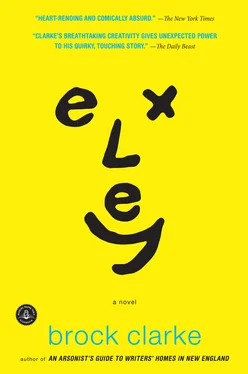“What do you think I should think?” I ask M.
M. nods, puts his head down again, and then starts weeping. If there is one way in which I lack as a mental health professional, it’s in my inability to “deal” with my patients’ weeping. I tell M. to please stop, that crying doesn’t do anyone any good. This only causes him to weep harder — harder and, indeed louder . I tell M. it’s important that he stay positive, which only results in an intensification of his weeping. Finally, I decide to remain quiet. Once again I fix my eyes on the letter. This time I’m not pretending to reread it. Because M.’s crying is so genuine and awful that it makes me think that something in the letter must be true, or at least true enough. I wait until M.’s weeping has diminished and then I ask, “What is A Fan’s Notes? ”
“It’s my dad’s favorite book,” M. says. “He reads it all the time.” His voice quavers and he wipes his nose with the back of his right hand.
“What’s it about?”
“I haven’t read it,” M. says quickly, too quickly. Aha , I think but do not say. I consider pressing M. on the subject, but he looks so pitiable, so sad and small. Pressing onward might be the best thing (diagnostically), but I just don’t have the heart (figuratively).
“I think that’s quite enough for today,” I say. We both rise. M. is a mess — his shoelaces floppy, his blue eyes red, his face splotchy — and suddenly I panic with the thought that his mother is waiting outside my office and will see M. in his sorry state and blame me. “Is your mother picking you up?”
M. shakes his head. He tells me he rode his bike here and will ride it home as well. I tell him that I am also something of a cyclist and that, for reasons environmental, physical, and fiscal, I much prefer my Schwinn to my Subaru. But M. appears to be unimpressed by our commonality. He leaves and I immediately pick up the phone and call M.’s mother’s office. The phone rings and rings and then I hear her voice. Alas, it is only her recorded voice, but still deep and lovely and stunning. Which is to say, it stuns me, so much so that I forget what is required of me “after the beep” for several seconds, until I realize how creepy the silence must sound. I identify myself. “Remember me?” I say, which, even to my ears, sounds unattractively needy — needy and, indeed, full of need . “M. mentioned a book today,” I say, and then state its title. Then I hang up before incriminating myself any further. But then I realize the hang-up is so abrupt that it is its own kind of incrimination. Oh, despair! Some people, when desperate, retreat to pills or hard liquor. I nap. After the phone message, I nap for two hours, then, feeling better, awake slowly to the sound of a bell ringing. This strikes me as an apt metaphor for how the mind announces that it has healed itself, until I realize that it is not a metaphor: someone is ringing my doorbell. I open the front door and walk out to the porch. There is nobody there. But at my feet I see a book. I pick it up. Attached to its cover is a yellow Post-it note that reads, “You asked for it!” and then M.’s mother’s signature.
The New Parrot
There were no parrots — that was one thing I noticed — nothing bright or feathered or talkative at all. The other thing I noticed was that this wasn’t a restaurant, like the book said it would be: it was a motel. The book had gotten it wrong. Or maybe the place had changed owners or something. Because it was definitely a motel. The neon sign outside said so, even though the O and T and E and L were out. Just the M was lit, flickering and buzzing to let you know what kind of place you were about to go into. I didn’t want to go into the New Parrot anymore. I really didn’t want to. It was scary. You know something is scary if you’ve read the book, even if you’ve only read part of the book’s first sentence, and what you’re seeing isn’t out of it. But I got off my Huffy, leaned it against the wall next to the door in case I needed to make a quick getaway, and went in anyway, for my dad.
It was so dark, and once my eyes adjusted to it, I saw why. The walls were covered in dark brown wallpaper that was meant to look like wood paneling. The carpet was dark brown, too, and wet: it squished as I walked on it. It was like walking on the kind of giant sponge you washed your car with. I looked up and saw why it was wet: the ceiling was one giant water stain, and water was dripping everywhere, with no buckets to catch it. Drip , the ceiling went, drip, drip . It was like a cave. Before I’d read Waiting for Godot , I’d read The Adventures of Tom Sawyer . The New Parrot’s lobby, or whatever it was, reminded me of the cave at the end of Tom Sawyer , except there was gold and bats in that cave; in this one there didn’t seem to be anything, not even furniture. I turned around and saw, at the far end of the room, a square opening in the wall, with a handwritten sign above the opening that said CHECK IN. I walked over. There was a chair on the other side of the hole but no one sitting in it. On the counter, there was the familiar bell, the nipple-shaped clanger that lets people you know you’re here . I hit it, gently at first and then harder, but it didn’t go clang , or ring , but instead went thunk . It was the most depressing room I’d ever been in: more depressing than whatever room my parents happened to be arguing in, more depressing than my dad’s hospital room, more depressing than my room right before I was made to clean it. Beyond the desk and to the left, I could see a hallway, also dark, and a series of doors on either side of it. It was the kind of hallway you see in nightmares.
And then, like in a nightmare, I could see someone, or something, walking down the hall toward me. My first thought was, It’s an elephant, and it’s coming to kill me , and I thought how weird it would be to read in the newspaper, BOY KILLED BY ELEPHANT IN NEW PARROT. Because that’s what it looked like in the dark: an elephant, or at least something with a trunk sweeping the floor as it came toward me. And then, as it got closer, it looked more like an elephant on its hind legs, or with only two legs, with its trunk sweeping the floor and making a squeaking sound, like a mouse. And then, when it was right in front of me, I could see that it wasn’t an elephant at all: it was a man, an old man, leaning on an upright vacuum cleaner that wasn’t totally upright but was instead curved, like an elephant’s trunk might be, and squeaking, like a mouse might. It was like waking up in the middle of the night and seeing a man sitting on your floor and asking him who he is, what he’s doing there, and he doesn’t answer, and he doesn’t answer, until you gradually realize he doesn’t answer because he’s a pile of dirty clothes that you were supposed to put in the hamper, and you end up being relieved and then disappointed. The man pushing the vacuum cleaner turned it on when he got to within a foot of me. It whined.
It whined, but the man didn’t seem to want to push it any farther. He didn’t even seem to notice I was standing right there, in his path. He just stared at the vacuum cleaner, then at the carpet, then at the vacuum cleaner, maybe thinking about the relationship between that which is dirty and that which is supposed to clean it. I took the book out of my jacket pocket — my eyes had adjusted enough to the darkness by now — and looked at the author photo on the back cover, then looked at the man in front of me. Both the man in the picture and the man in front of me wore beards and had cigarettes hanging out of their mouths. The man in front of me looked a little thinner, a little more stooped, a little more wrinkly, a little more used, but that made sense: after all, he was — years older than he’d been when he’d written the book, when the picture on the book had been taken. I could see him smoking and drinking his way from the way he was then to the way he was now. He still hadn’t looked at me; he was still staring at the vacuum cleaner. But I knew it was Exley: it was definitely Exley. I knew it in my bones, too. I felt lucky. That’s what I was thinking — I am so lucky. My dad is so lucky —as I took a step closer to him and said, “Mr. Exley, my name is Miller Le Ray. My dad is a big fan, the biggest.” Then I stuck out my hand, as I’d been taught to do.
Читать дальше












